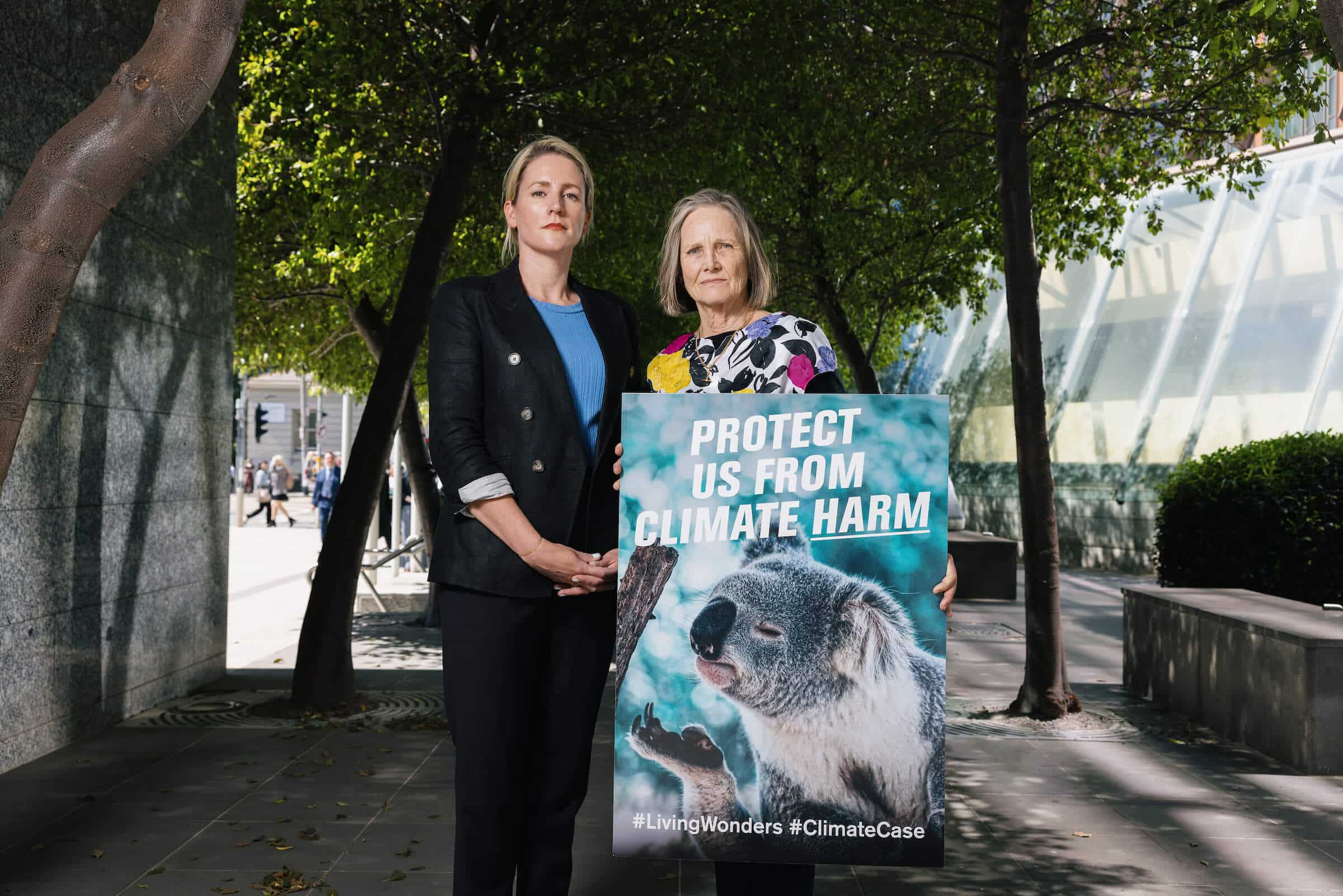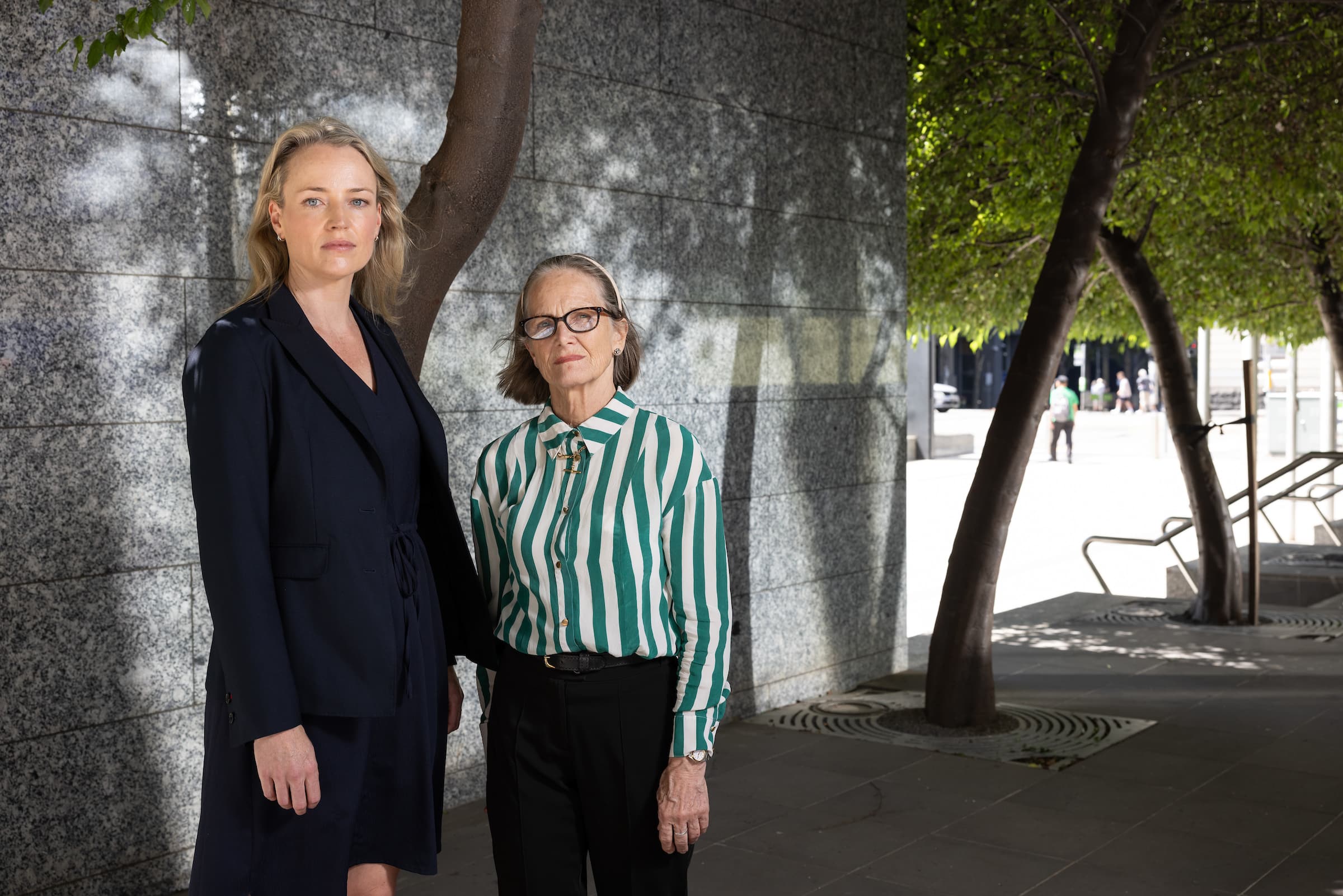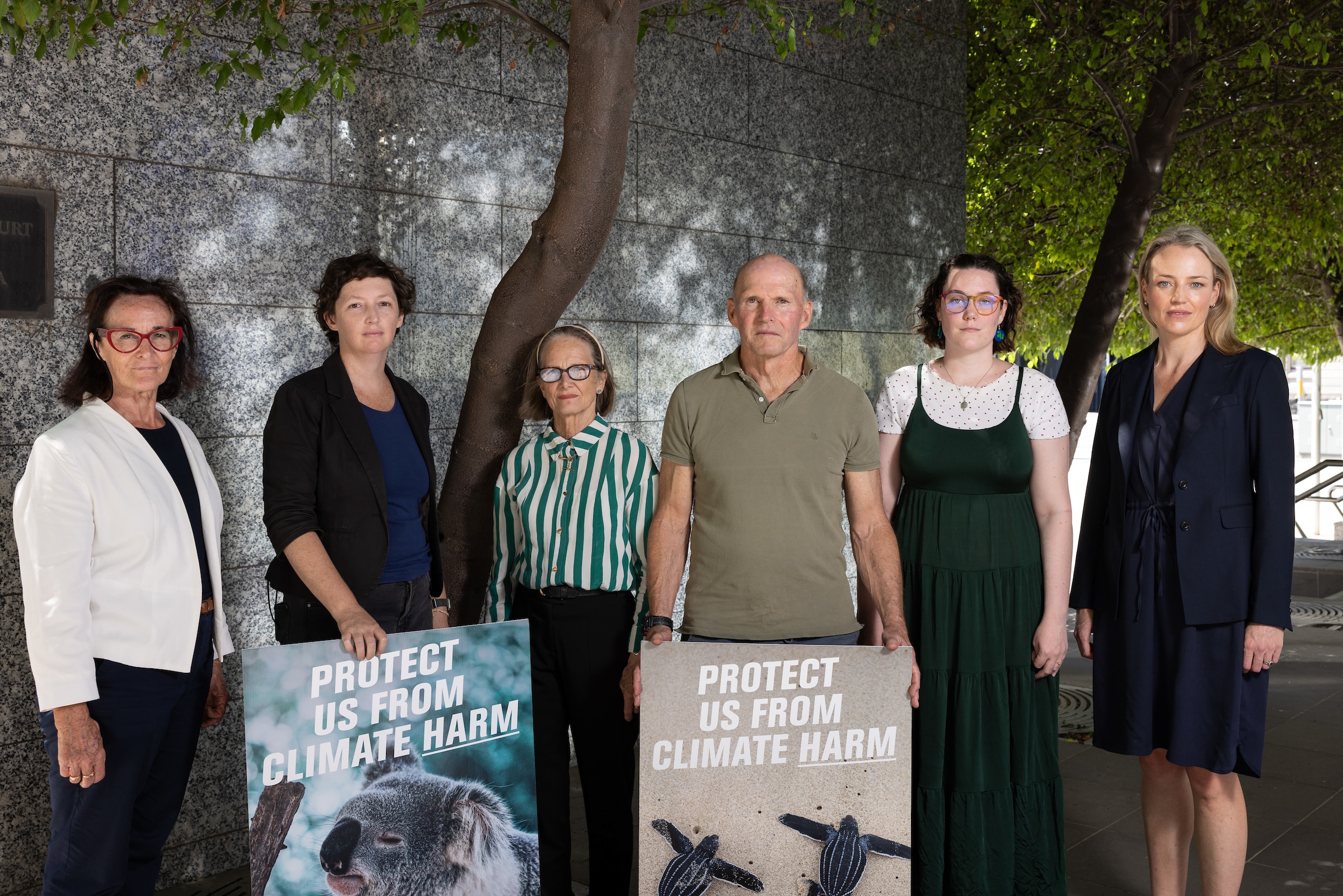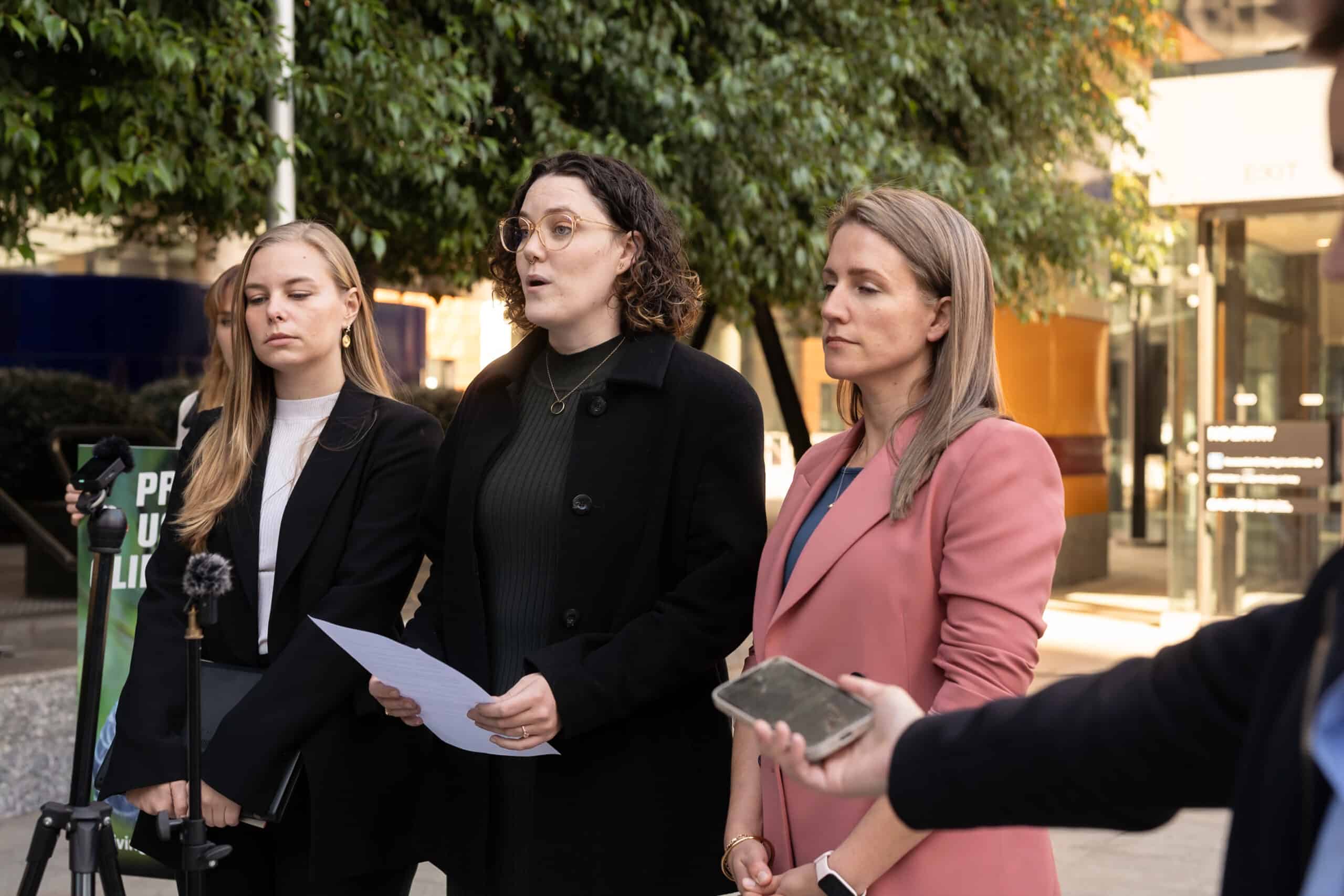The Living Wonders climate cases have generated considerable public interest. These legal updates provide factual information about the application for special leave to appeal to the High Court.
High Court refuses ECoCeQ leave to appeal
12 August 2024
On 8 August 2024, the High Court handed down its decision in relation to the Environment Council of Central Queensland’s (ECoCeQ’s) applications for special leave to appeal from the Full Federal Court’s judgment, which dismissed the landmark Living Wonders climate cases.
In the decisions, the High Court refused ECoCeQ’s special leave applications, determining that neither case would be “an appropriate vehicle” to determine a key issue relating to how “impact” is defined under the EPBC Act (Australia’s national environmental laws), noting that this issue had not been decided by the Full Federal Court. The High Court also determined that ECoCeQ’s applications otherwise had “insufficient prospects of success” to warrant granting leave to appeal.
There are no further avenues of appeal once a matter has been decided by the High Court. The refusal of ECoCeQ’s special leave applications marks the end of this phase of ECoCeQ’s two-year legal battle, which sought to argue the federal Environment Minister had a legal obligation to properly consider the climate harm of two huge coal mine expansions in NSW when assessing their environmental risk.
If approved, these coal mine expansions, the Narrabri Underground Extension Project and the Mount Pleasant Optimisation Project, would emit a further 526 million tonnes (approx.) of greenhouse gas emissions into the atmosphere. The Mount Pleasant project would become the biggest coal mine in Australia, three times larger than the Adani coal mine approved by the Morrison Government and the Narrabri project, if approved, would destroy 500 hectares of critical habitat for endangered koalas.
What the cases were about: The Environment Minister’s risk assessment decisions and ECoCeQ’s arguments
The cases concerned two 2023 decisions by the Minister relating to the Narrabri and Mount Pleasant coal proposals, which ECoCeQ challenged all the way to the High Court.
In these decisions, the Minister:
- accepted that the extraction of fossil fuels contributes to climate change; and
- accepted ECoCeQ’s analysis about the devastating effects of climate change on Matters of National Environmental Significance right across the Australian environment.
However, the Minster did not accept that the impacts of the particular projects would be substantial. She rejected ECoCeQ’s argument that these projects meet the legal test for an ‘impact’ under the EPBC Act on the basis that:
- First, each proposed coal mine will not cause a net increase in global Greenhouse Gas Emissions. ECoCeQ argued that this analysis, which invoked hypothetical other projects that would likely meet coal purchasers’ demand, involved “substitution reasoning” that is not allowed under the law.
- Second, even if the proposed coal mine could be established to cause an increase in global greenhouse gas emissions, any contribution from that would be ‘very small’ and it’s not possible to say it would be a substantial cause of physical effects of climate change. This analysis, commonly referred to as “drop in the ocean” logic, was challenged by ECoCeQ on the basis that with this analysis, the Minister was assuming a future world in which global greenhouse gas emission continue to be very high.
Unfortunately, after many months of preparation and days of complex legal argument in Court, ECoCeQ’s arguments were unsuccessful.
The Full Court’s decision
The High Court’s refusal of ECoCeQ’s special leave applications means that the Full Federal Court’s decision dismissing ECoCeQ’s legal challenges now stands.
You can read more about the Full Court’s decision here.
In summary, in May 2024 the three judges of the Full Federal Court dismissed ECoCeQ’s appeals.
- A majority judgment of Chief Justice Mortimer and Justice Colvin disagreed with ECoCeQ’s interpretation of the Minister’s reasons. Their Honours found that in her reasoning process, the Minister had assumed the mines would go ahead and had not done the counterfactual or substitution reasoning that ECoCeQ had argued she did. This meant that ECoCeQ’s arguments about this reasoning being unlawful had to be dismissed. Because of this conclusion, the majority did not need to address the arguments relating to the interpretation of ‘impact’ under the law and how it applies in the context of climate emissions, and whether counterfactual reasoning is permissible under the EPBC Act.
- The separate judgment of Justice Horan also decided the appeals should be dismissed, but for different reasons. His Honour accepted that the Minister was required to identify the direct and indirect consequences of the mines going ahead, and not to hypothesise what might happen in a future in which these mines do not go ahead. However, Justice Horan concluded that it was legally permissible for the Minister to conclude that many uncertainties and “variables” affecting the potential contribution of the mines’ emissions to climate harms meant she could not be satisfied the relevant legal test was met; that is, it was lawful for her to conclude that the emissions from each mine would not be a “substantial cause” of adverse effects on the environment.
In dismissing ECoCeQ’s appeals, the Full Court acknowledged the adverse climate consequences of the way in which the Minister had reasoned. The majority noted that ECoCeQ’s arguments on the appeal underscored the “ill-suitedness” of the EPBC Act “to the assessment of environmental threats such as climate change and global warming and their impacts on [protected species and places] in Australia.”
Despite losing the cases, in a significant costs judgment handed down in July 2024, the Full Court decided that ECoCeQ did not need to pay the legal costs of the Minister nor the two coal companies that joined the proceedings to defend the Minister’s decisions in the appeals. The Court reached this conclusion based on the public interest in the outcome of ECoCeQ’s litigation, finding that the interests of justice favoured an outcome where parties bear their own costs of the appeal proceedings.
In reaching this decision on costs, Chief Justice Mortimer observed that the EPBC Act was designed to protect Australia’s environment. Given “the environment cannot speak for itself; someone must speak for it”, her Honour noted that community organisations like ECoCeQ play an important role in advancing legal arguments which could clarify the operation of EPBC Act provisions that aim to protect the environment.
Read more about the public interest costs judgment here.
What this now means
The Full Court’s decision confirms that the Environment Minister, in performing her obligations under the EPBC Act in its current form, has broad discretion in how she performs her environmental risk assessments. How the Minister weighs up the evidence before her regarding a project’s possible impacts involves questions of evaluation and judgement.
The outcome in these cases means that the Minister, in her risk assessment for the Narrabri and Mount Pleasant coal mine expansions, was not legally required to properly scrutinise and account for the climate impacts that these projects will cause on protected plants, animals and places. The Court confirmed the Minister was allowed to decide that the emissions from each of these projects will not be a “substantial cause” of the adverse climate effects on the environment because she assessed them to represent a very small portion of global emissions, resulting in her conclusion that that the emissions from each of the proposed projects would not meet the legal definition of “impact” under the EPBC Act.
With the finalisation of these court cases, the Minister can now move to approve the Mount Pleasant and Narrabri projects without considering the climate impacts of the emissions from these new coal expansions.
However, the Court observed that, whilst she did not reason in an unlawful way, a “different approach” to the assessment of “substantial cause” may have been open to the Minister.
Although it is close to the end of the road for the Mount Pleasant and Narrabri coal expansions being approved, there are still 11 of ECoCeQ’s reconsideration requests on the Minister’s desk waiting for a decision.
These 11 other proposals would collectively emit a further 14,623 million tonnes of greenhouse gas emissions into the atmosphere. The EPBC Act does not specifically require the Minister to scrutinise climate impacts of new proposals, and ECoCeQ’s appeals have demonstrated the law gives the Minister significant freedom in how she conducts her assessments.
However, in the context of the Living Wonders climate cases, the Minister has accepted without qualification the certainty of the causal connection between greenhouse gas emissions and climate change, and she has recognised the scale of the environmental threat across many, many protected plants, animals and places throughout Australia posed by climate change. ECoCeQ maintains that the Minister can and should take account of these impacts with her future decisions.
The 11 other proposals that are subject to reconsideration requests before the Minister are:
- North West Shelf Extension – Woodside Energy – Pilbara, WA
- Alpha North Coal Mine Project – Waratah Coal – Galilee Basin, western Qld
- Gas Supply Security Project, Australia Pacific LNG – Surat and Bowen Basins, central and south-west Qld
- Baralaba South Coal Project – Mount Ramsay Coal Company – Bowen Basin, central Qld
- Moorlands open cut coal mining project – Cuesta Coal – Bowen Basin, central Qld
- Saraji East coal mining project – BHP Billiton Mitsubishi BM Alliance – central Qld
- Winchester South coal mine project – Whitehaven – central Qld
- Lake Vermont Meadowbrook Coal Mine Project – Bowen Basin Coal – central Qld
- Boggabri coal mine expansion – Idemitsu – northern NSW
- Meandu Mine King 2 East Project – TEC Coal (Stanwell) – south east Qld
- Caval Ridge Mine Horse Pit Extension – BHP Mitsubishi Alliance – Bowen Basin, central Qld
Minister agrees not to approve plans for 13 new coal or gas mines before Living Wonders High Court applications are determined
25 June 2024
The Environment Council of Central Queensland (ECoCeQ) has applied for special leave to the High Court of Australia to appeal the Full Federal Court’s dismissal of the landmark Living Wonders climate cases.
ECoCeQ argued in these cases that the Environment Minister is legally required to protect our environment from the climate harm of two huge coal mine expansions in NSW: the Narrabri Underground Extension Project and Mount Pleasant Optimisation Project.
With its applications to the High Court, ECoCeQ has argued that these cases raise legal questions of public importance.
While these applications for special leave to appeal are determined, Environment Minister Tanya Plibersek has given written assurance to ECoCeQ that she will not approve plans for 13 new coal and gas projects. This includes the proposed Narrabri and Mount Pleasant coal expansions that are the subject of the litigation.
If special leave is granted, ECoCeQ will ask the High Court to clarify the Environment Minister’s legal obligations when assessing these two huge coal mine expansions for their grave risk of climate harm.
Alongside ECoCeQ’s legal challenges relating to the Narrabri and Mount Pleasant coal proposals, there are 11 other new coal and gas projects subject to the Living Wonders legal intervention which are still before the Minister, awaiting her decision on ECoCeQ’s reconsideration requests.
Given the similar legal issues raised, the outcome of the Narrabri and Mount Pleasant court cases may be relevant to the Minister’s decisions on these 11 other proposals:
- North West Shelf Extension – Woodside Energy – Pilbara, WA
- Alpha North Coal Mine Project – Waratah Coal – Galilee Basin, western Qld
- Gas Supply Security Project, Australia Pacific LNG – Surat and Bowen Basins, central and south-west Qld
- Baralaba South Coal Project – Mount Ramsay Coal Company – Bowen Basin, central Qld
- Moorlands open cut coal mining project – Cuesta Coal – Bowen Basin, central Qld
- Saraji East coal mining project – BHP Billiton Mitsubishi BM Alliance – central Qld
- Winchester South coal mine project – Whitehaven – central Qld
- Lake Vermont Meadowbrook Coal Mine Project – Bowen Basin Coal – central Qld
- Boggabri coal mine expansion – Idemitsu – northern NSW
- Meandu Mine King 2 East Project – TEC Coal (Stanwell) – south east Qld
- Caval Ridge Mine Horse Pit Extension – BHP Mitsubishi Alliance – Bowen Basin, central Qld
ECoCeQ has received written assurance from the Environment Minister that neither the Minister nor her delegate will make any decision to approve either Narrabri, Mount Pleasant or these other 11 pending coal and gas proposals currently before the Minister for reconsideration, until ECoCeQ’s applications for special leave in the High Court are determined.
Australia’s environment laws in the spotlight as High Court application lodged over new coal and gas
14 June 2024
A small community group from Central Queensland has applied to the High Court over the Environment Minister’s refusal to act on the climate impacts of plans for two large coal mine expansions.
The Environment Council of Central Queensland (ECoCeQ) has applied for special leave to Australia’s highest court to appeal the Full Federal Court’s dismissal of the landmark Living Wonders climate cases.
Represented by lawyers from Environmental Justice Australia, ECoCeQ argued in these cases that the Environment Minister is legally required to protect our environment – including koalas, the Alps and the Great Barrier Reef – from the climate harm of two huge coal mine expansions in NSW: the Narrabri Underground Extension Project and Mount Pleasant Optimisation Project.
Mining companies Narrabri Coal Operations (a subsidiary of Whitehaven Coal) and MACH Energy joined Minister Tanya Plibersek in Court, defending her refusal to act on the scientific evidence of climate risk.
Australia’s environment laws in the spotlight as High Court application lodged over new coal and gas
Christine Carlisle, Environment Council of Central Queensland (ECoCeQ) President said:
“We’re a small volunteer group. We don’t want to go to the High Court, but our climate is breaking down and we feel we have no choice.
“We’ve applied to the highest court in the land because there are currently 117 new coal and gas projects in the pipeline in Australia – and 35 new coal projects on the Environment Minister’s desk awaiting approval right now.
“MACH Energy wants to run the biggest coal mine in Australia until nearly 2050 at Mount Pleasant. Whitehaven wants to keep mining mind-boggling amounts of coal from Narrabri until 2044. These two coal mines will fuel billions of tonnes of climate emissions in coming years. We argue that damage needs to be carefully assessed under our environment laws.
“We’ve applied to the High Court because the Environment Minister could imminently greenlight these huge coal mines without properly assessing their climate risk to our environment.
“The outcome of this High Court application stands to impact all pending coal and gas projects currently awaiting approval on the Minister’s desk.”
Ellie Smith, Environment Council of Central Queensland (ECoCeQ) volunteer said:
“The Environment Minister’s fundamental job is to protect our environment. We say it’s unlawful for her to ignore the climate risks that huge new coal mines pose to our environment.
“Instead of standing up to fossil fuel companies, Australia’s Environment Minister keeps standing with them in court, defending her refusal to act on the climate harm of new coal and gas mines.
“The Environment Minister says she accepts that coal and gas mines have profound and devastating effects on our climate and environment. But she’s refusing to act on that harm.
“The science is clear. We are in a climate crisis, and every new coal and gas project is pouring more fuel on the fire.
Environmental Justice Australia Co-CEO Elizabeth McKinnon said:
“ECoCeQ has applied to the High Court because they argue the Living Wonders climate cases present a question of law of significant public importance.
“If leave is granted, our client will ask the High Court to clarify the Australian Environment Minister’s legal obligations when assessing huge coal mines for their grave risk of climate harm.
“Australia’s High Court has never considered the scope or operation of Australia’s national environmental law, or the requirements around environmental risk assessments and the Minister’s power to approve or refuse proposed projects.




